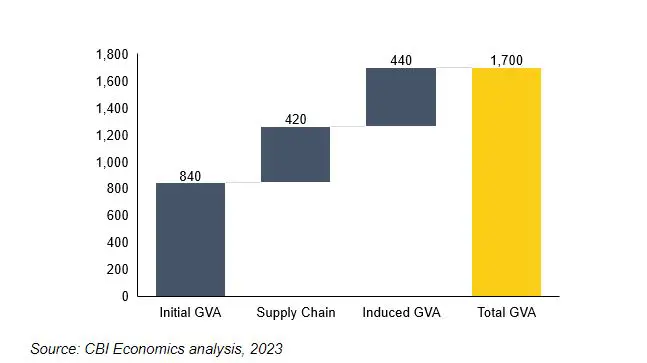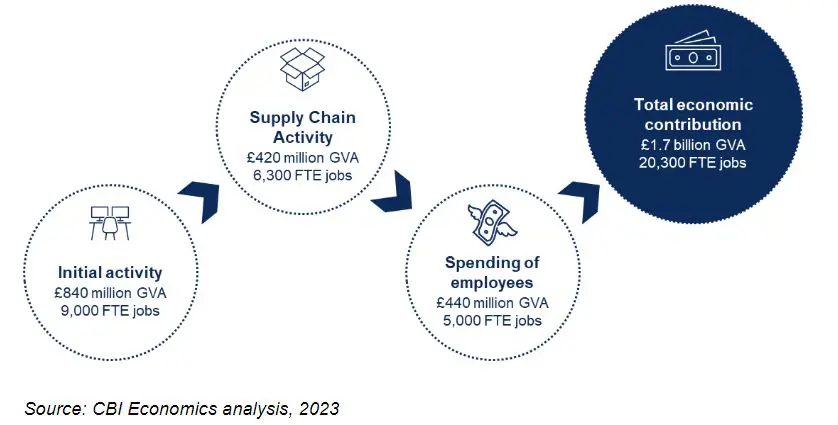CBI Economics analyses the contribution – and the potential – of one of the UK’s most innovative sectors.
Key takeaways
- The UK quantum industry currently contributes £1.7 billion in GVA to the UK economy
- Quantum firms already support an estimated 20,000 full-time equivalent (FTE) employees across the UK
- And they're 33% more productive than the national average, adding £93,000 in GVA per FTE job to the UK economy.
Quantum technology is still very much in its infancy. It’s yet to generate the same attention as other innovative technology such as AI and machine learning. But it has the potential to have a huge impact on everything from healthcare and financial services to defence and even weather services.
CBI Economics has teamed up with The Data City to bring you the facts about the industry leading the charge in developing quantum technologies and analyse the impact the quantum industry is already making on the UK economy.
Due to the nature of the quantum industry, it’s difficult to map these companies onto traditional Standard Industrial Classification (SIC) codes and as a result it can be hard to determine the economic impact of the industry. So we’ve used our proprietary in-house model to estimate the economic contributions of quantum companies that fall within The Data City’s definition of the industry. That covers software, components, materials or expertise relating to quantum computing and relevant areas of photonics.
Our analysis captures the value derived from the activity of these companies, the supply chain they support and the demand for wider UK goods and services they fuel. However, we have not valued the additional economic benefits that access to quantum computing capabilities could bring to other industries. And that is likely to be significant.
The quantum sector has grown 81% since 2013, and now contributes an estimated £1.7bn to the UK economy.
In the UK there are currently 574 companies classified as quantum companies by The Data City. Of these, 26% are based in the South East and 13% in the East of England. Given that these two regions create the highest levels of economic activity with regards to the manufacturing of computer, electronic and optical products, that’s not a surprise.
While The Data City classifies 30% of quantum companies in the UK as established, more than half (55%) are start-ups, and the number of active companies has increased 81% since 2013. According to our modelling, their activity supports a total of £1.7bn in gross value added (GVA) per year to the UK economy (0.04% of UK’s total GVA). For comparison, and despite it's nascency, this already equates to half the economic contribution of the construction sector in the north east (£3.4bn).
Total GVA contribution of the quantum economy

Just under half (49%) of the total GVA, or £840m, was generated directly by the activities of quantum companies, with the rest made up from the wider economic contributions associated with the quantum economy. These wider contributions include the supply chain impact (£420m) and the increased consumption generated by the disposable income of workers (£440m). The direct value is high relative to these wider contributions, as is typically the case with service industries where supply chains are traditionally smaller.
The quantum sector supports 20,000 full-time equivalent jobs and has attracted £1.4bn in investment since 2016.
Our modelling also shows that quantum companies support just over 20,000 full-time equivalent (FTE) employees across the UK. This accounts for 0.08% of total jobs across the UK economy. Of the full-time jobs supported by the quantum economy, 9,000 (45%) were created directly by quantum businesses.
Total economic contribution of quantum companies

Data from Dealroom shows that quantum companies have seen a total of £1.4bn in investment funding since 2016. Only £300m was recorded in the 15 years prior to this, showing the nascency of the industry.
Our modelling also suggests that on average the quantum economy adds £93,000 in GVA to the UK economy per FTE job – 33% higher than the UK average of £70,000 – highlighting the industry’s impressive productivity.
But the contribution of the growing quantum industry to the economy won’t stop there.
Quantum technology presents a particularly exciting opportunity for our economy due to the wide range of possible applications.
In financial services, JP Morgan and IBM researchers have outlined how quantum technology could be used to dramatically speed up the Monte Carlo simulation model – used to gauge the probability of potential outcomes and their associated risks.
In healthcare, or more specifically drug development, Alphabet CEO Sundar Pichai has pointed to quantum’s ability to simulate molecules and molecular processes. Accurately modelling how new drugs will impact different diseases and conditions could lead to the development of breakthroughs in the treatment of serious illnesses such as cancer or heart disease.
And in agriculture, Microsoft has already made progress in finding a way to simulate the Haber process – the extremely energy intensive way in which a lot of the world’s plant fertiliser is produced.
These applications are just the tip of the iceberg. But progress in quantum technology is needed before we can realise its potential, and it relies on researchers and firms being able to effectively innovate, develop, produce and use any advancements in the technology. That depends on the government helping to cultivate the right environment – something the 10-year vision within its National Quantum Strategy published earlier this year sought to address.
As ever, the impact of quantum technology will depend on the detail and the delivery, but without doubt quantum technologies represent a great opportunity for the UK economy and society. We hope that an understanding the economic contribution of the quantum industry will help drive broader discussions on how best to use the technology, and how to create a supportive environment for it flourish.
About CBI Economics:
At CBI Economics, we have a team of dedicated economists with wide-ranging experience in evidencing policy recommendations. We can help you calculate the fiscal costs of your policy ideas, demonstrate their economic impact, and even help you to best articulate the issues you face through economic evidence.
Get in touch today to find out more about economic consultancy from CBI experts.










